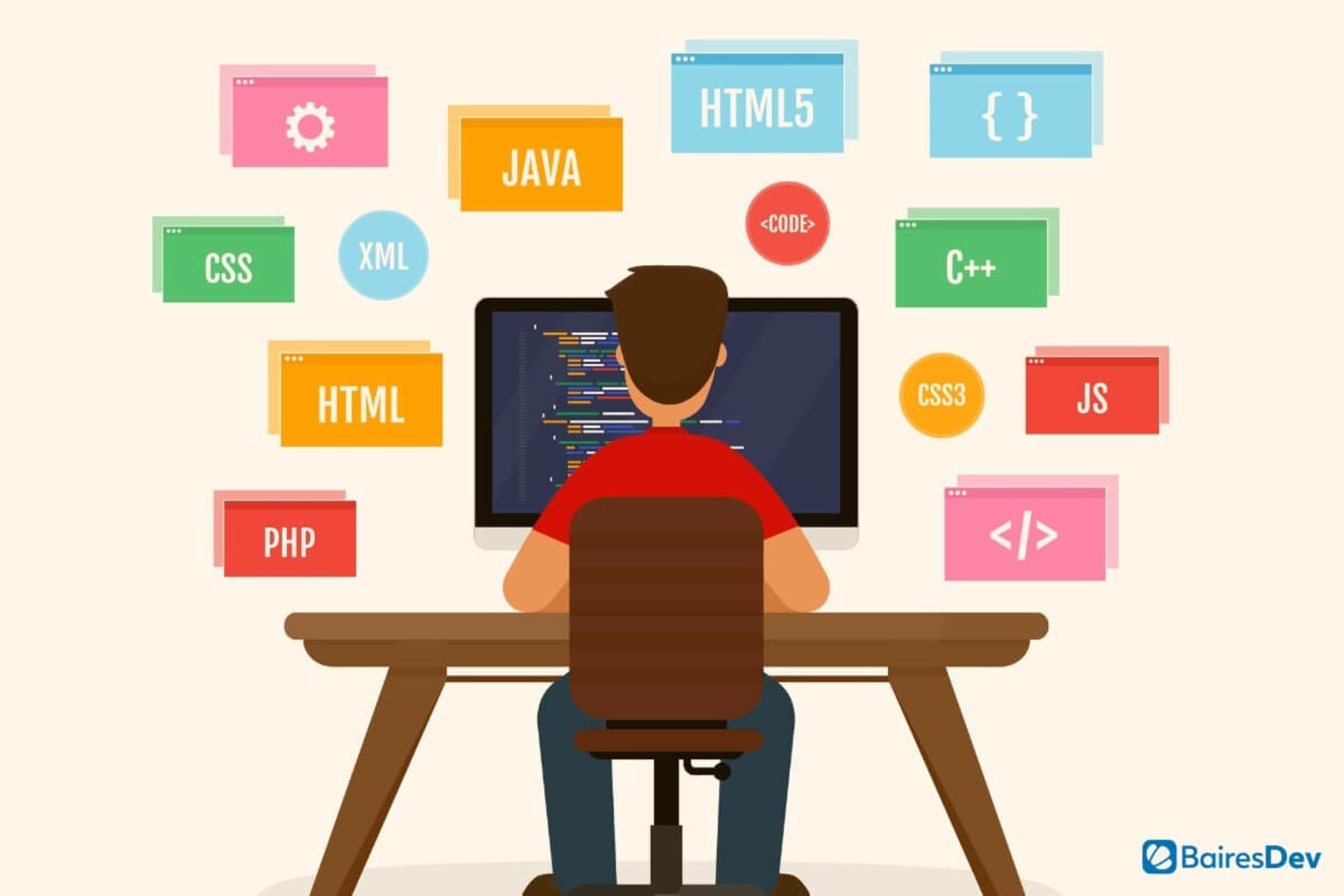Programming languages are the foundation of a wide variety of tools every business in every sector uses today. They are the backbone of applications, systems, programs, games, everyday tools, and other software. Simply put: without them, the modern world wouldn’t be what it is today.
But with so many choices of languages available today, how do you know which ones are the best options for your business? The fact is, they all have their strengths and weaknesses. That’s why we’ve broken down the purposes and use cases for some of the most popular options.
1. Best Language for Research, Data Science, or Data Analytics: Python
Python is the language of choice for so many different types of software. It’s straightforward to learn and use, thanks to its simple syntax and other features, making it an excellent option for beginners and those looking to code quickly. It also comes with numerous frameworks and libraries, which add to its popularity for data science use and other purposes.
One area where Python really shines is in the science landscape. The language is ideal for scientific computing, machine learning (ML), and data collection and analysis. Developers love it — as do others in the research and science community.
Python’s popularity in data science may be due to its ease of use and extensive libraries.
Just a few of the perks software developers enjoy when working with Python include:
- Extensive libraries and frameworks, such as Flask and Django
- Automatic garbage collection
- Portability
- GUI support
Disadvantages
Of course, there are some drawbacks to using Python. They include:
- Runtime errors
- Slow speed
- High memory consumption
2. Best Language for Web Applications: JavaScript
Now for a language that hardly needs an introduction: JavaScript. For the 10th year in a row, JavaScript was named the most commonly used programming language in Stack Overflow’s 2022 Annual Developer Survey, with more than 65% of developers saying they rely on it.
Why is JavaScript so ubiquitous? It has longevity on its side, but that’s not all. One primary reason why it’s so popular is that it can run everywhere. The language runs on all major browsers: Internet Explorer, Safari, Google Chrome, Mozilla Firefox, Opera, Edge — and even some lesser-known browsers, too. This means code compilation is not necessary before executing the language.
JavaScript is often regarded as the top choice for web development. It was introduced in 1994 for this very purpose, and today, it’s widely considered the gold standard for web applications, web pages, and web programs alike.
JavaScript is both a front- and back-end language. One of the top use cases is to add responsive, dynamic elements to websites, but it’s not the only one.
If you want to join the ranks of Microsoft, Uber, Facebook, Google, Netflix, eBay, and other major companies, JavaScript is something you should add to your repertoire.
Disadvantages
JavaScript’s drawbacks include:
- Difficulty developing larger applications
- Code visibility to all users (client-side security)
- High error tolerance
3. Best Language for Writing Google Programs: Kotlin
Sure, Java was once the official Android language, but Kotlin pushed it aside. In fact, it has reigned as the preferred Google programming language since 2017. In fact, not only the tech giant offers extensive support for its favorite child — or rather, language — but it also offers comprehensive advantages to developers who use Kotlin. Developers enjoy plenty of special features when they leverage the language, including productive programming, which allows it to reuse code across different environments.
You’ll have a leg up when you use Kotlin development services over other languages to build Google products and programs. But the benefits don’t end there. It’s also easy to use and can be applied to a range of software and systems. You can also use it wherever and whenever you use Java. Other advantages include reliability, efficiency, fast coding, interoperability, expressiveness, code safety, and easy maintenance.
Disadvantages
Drawbacks to Kotlin include:
- Steeper learning curve
- Slow compilation speed
- Not a replacement for Java
4. Best Language for Game Development: C++
C++, which finds its foundation in C, is widely applicable to many different products, from data analytics to GUI applications. Perhaps this is why it’s embraced by LinkedIn, NASA, Facebook, Google, Lyft, Walmart, Opera, Microsoft, and many other top companies.
However, C++ is perhaps best known for gaming. The Unreal Engine, for example, leverages C++. So many companies that produce 3D games and other dynamic products turn to the language — in fact, it has been one of the most popular choices for this purpose for decades. It is capable of adding complex elements to gaming systems, along with other benefits, like creating graphical interfaces.
There are plenty of frameworks or game engines facilitating easier game development with C++, such as Unreal Engine, and Flax Engine.
By all means, don’t limit your use of C++ to games — it has numerous other applications. But if you are thinking of getting into the business, don’t neglect it.
Disadvantages
C++’s disadvantages include:
- Difficulty debugging
- High memory consumption
- Some safety issues
5. Best Multiplatform Language: Java
Released in 1995 by Sun Microsystems, which was later acquired by Oracle, Java is one of the most extensively used programming languages in the world. Today, it’s applied to a huge range of projects and used across platforms, from mobile to desktop. The portable, server-side language has a presence in fields like e-commerce, finance, and many other industries, in part due to features like strong security.
- Android apps
- Games
- Big data projects
- Numerical computing
- Web applications
- IoT projects
- Desktop apps
- Enterprise apps
Java offers extensive support, and it’s quite user-friendly. It benefits from the assistance of frameworks like Spring for enterprise applications and Struts for web apps. Perhaps this is why Java is considered such a multipurpose language, as it can be extremely helpful no matter what the project, platform, or field.
Disadvantages
Java’s drawbacks include:
- Poor GUI
- Low performance
- High memory consumption
6. Best Language for Large Projects: Go
If C++ is too complicated and difficult to learn, Go could be the answer. The language was initially developed in 2007 by Google, and despite the fact that it is relatively young compared to other popular languages, it has since skyrocketed in popularity. Part of its appeal comes from its simplicity.
Not only is Go used for projects like APIs, machine learning, web applications, and mobile applications, but it can also be applied to huge projects, like multi-faceted systems and data processing. In fact, large programs were the original impetus for creating the language in the first place.
Today, Go is a top programming language, a highly modern one that many large businesses turn to routinely.
Disadvantages
Go’s drawbacks include:
- Poor library support
- Time-consuming
- Low maturity
What’s the Best Programming Language for Your Project?
When working on a development project, you have your choice of programming languages. These aren’t the only options, of course, but they are some of the most popular ones you can turn to — ones that offer many advantages to new and seasoned developers, startups, and long-established corporations alike. Whether you’re building a web app, a game, or an ERP system, one of these languages is bound to meet your needs.










